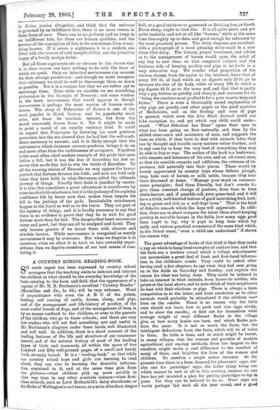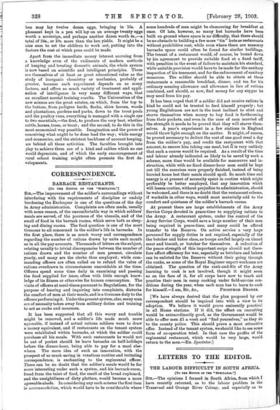A COUNTRY SCHOOL READING-BOOK.
S0 much regret has been expressed by country school managers that the teaching omits to instruct and interest the children in what should be the everyday knowledge of the facts relating to the farm and field, that the appearance of a reprint of Mr. H. B. Buchanan's excellent " Country Reader" (Macmillan and Co., ls. 6d.) will be very welcome. Want of acquaintance with even the A B C of the points, feeding, and rearing of cattle, horses, sheep, and pigs, and of the management and life-history of poultry, of the most useful breeds of dogs, and of .the management of bees, is by no means confined to the children, or even to the parents of the children, who go to these schools; and there are very few readers who will not find something new and useful in Mr. Buchanan's chapters under these heads, well illustrated and well told. In addition, there is a short account of the leading features of the life and structure of our commoner insects, and of the natural history of most of the leading types of birds and mammals, all within the space of two hundred and fifty well-printed pages of a small and bandy book, strongly bound. It is a " reading-book," so that while our country school boys and girls are learning to read aloud, they can also be learning the desirable informa- tion contained in it, and at the same time gain from the pictures—what children pick up more quickly in that way than in any other available indoors—what first- class animals, such as Lord Rothschild's dairy shorthorns, or the Duke of Wellington's cart teams, or a nrize Aberdeen-Angus bull, or a good retriever or gamecock or Dorking hen, or South Down sheep, ought to look like. It is all quite short, and yet quite readable, and not at all like "lessons," while at the same time thoroughly up to date, and good enough for reference by the most practical person. The dairy chapters are excellent, with a photograph of a most pleasing dairy-maid in a nice clean tiled dairy. The history, proper treatment, and advice as to the management of horses would open the mind of any boy to new ideas on that congenial subject, and the business side of keeping poultry and pigs is set forth in a very attractive way. We wonder what proportion of the various classes, from the squire to the labourer, know that of every 100 lb. of food which an ox digests only 23 lb. go to increase the size of its body, while of every 100 lb. which .a pig digests 46 lb. go to the same end, and that that is partly why a pig fattens so quickly and cheaply, and accounts for its " being the creature most profitable for a poor man to keep and fatten." There is even a thoroughly sound explanation of why pigs are greedy, and other pages on the good qualities of Berkshires, and on the feeding and uses of pigs in general, which even the Live Stock Journal could not take exception to, and yet which any child could under- stand. " What Selection has Done" opens their eyes to what has been going on, first naturally, and then by the skilled observance and assistance of man, and suggests the lines on which, if they have to deal with animals later, they can by thought and trouble carry matters rather further, and in any case try to keep the very best of everything they may be able to buy or rear. The author of the book is a landowner, with tenants and labourers of his own, and an all-round man, so that his sensible remarks and additions, the outcome of ex- perience, fall naturally into their places. These would be keenly appreciated by country boys whose fathers plough, reap, take care of horses, or milk cattle, because they hear them discussed at home. " Manage your stook on common- sense principles; feed them liberally, but don't overdo it; give them constant change of pasture; from time to time chain-harrow, and if possible roll, your grass-land, and it will have a thick, well-knitted bottom of good nourishing feed, look. ing as green and rich as a well-kept lawn." That is the kind of didactic remark which the boys will appreciate. In addi- tion, there are in short compass the latest ideas about keeping poultry in movable houses in the fields, how many eggs good hens ought to lay, why it pays to keep hens which lay early, and various practical economics of the same kind which, in the literal sense, "even a child can understand" if shown the reason why.
The great advantage of books of this kind is that they make a peg on which to hang local examples of outdoor lore, and that the facts are a nucleus round which a village schoolmaster can accumulate a great deal of fresh and first-hand, informa- tion in the children's minds. They could be asked, after having read a few chapters, to say what they had seen going on in the fields on Saturday and Sunday, and explain the reason for what was being done. They could be induced to take an interest in what animals, from horses to rabbits, win prizes at the local shows, and to note which of their neighbours do best with their chickens or pigs. There is always a keen competition as to the latter, and local emulation as to other animals would probably be stimulated if the children were keen on the results. There is no reason why the little ones should not learn how to pack and size eggs nicely, and to show the results ; or find out for themselves what average weight of wool different flocks in the village give, or how many lambs are born, and which flocks pro- duce the most. It is not so much the facts, but the intelligent deductions from the facts, which will be of value to them. So little is done, and so much might be learnt, in many villages, that the reasons and practice of modern agricultural and rearing methods, from the largest to the smallest, might make a real difference to the comfort of many of them, and brighten the lives of the women and children. To mention a single minor instance. At the present time there is a keen demand for pheasants' eggs, ark' also one for partridges' eggs, the latter thing being one which cannot be met at all in this country, because no one here has yet invented a plan for getting partridges to lay in pens. Yet they can be induced to do so. Hens' eggs are worth perhaps lid. each all the year round, and a good
hen may lay twelve dozen eggs, bringing in 15s. A pheasant kept in a pen will lay on an average twenty eggs worth a sovereign, and perhaps another dozen worth 4s.,—a total of 24s., or 10s. more than the hen yields. It might be a nice sum to set the children to work out, putting into the factors the cost at which pens could be made.
Apart from the immediate money interest accruing from a knowledge even of the rudiments of modern methods of keeping and treating domestic animals, the whole system is now based on scientific and intelligent principles. These are themselves of at least as great educational value as the study of inorganic chemistry or mechanics, probably of greater, because each experiment depends on so many factors, and offers so much variety of treatment and appli- cation of intelligence in very many different ways, that an excellent mental training results. The Universities of the new science are the great estates, on which, from the top to the bottom, from pedigree herds, flocks, shire horses, woods and plantations, gardens and parks, down to the trout pools and the poultry runs, everything is managed with a single eye to two essentials,—the first, to produce the very best, whether cattle, horses, trees, or trout; and the second, to do this in the most economical way possible. Imagination and the power of conceiving what ought to be done lead the way ; while energy and economies, and the strictest backbone of account keeping, ire behind all these activities. The faculties brought into play to achieve them are of a kind and calibre which no one would depreciate, and of which the early encouragement of rural school training might often promote the first de- velopments.











































 Previous page
Previous page